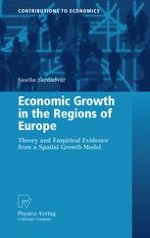2011 | OriginalPaper | Buchkapitel
4. Convergence: Theory and Evidence
verfasst von : Asst. Prof. Sascha Sardadvar
Erschienen in: Economic Growth in the Regions of Europe
Verlag: Physica-Verlag HD
Aktivieren Sie unsere intelligente Suche, um passende Fachinhalte oder Patente zu finden.
Wählen Sie Textabschnitte aus um mit Künstlicher Intelligenz passenden Patente zu finden. powered by
Markieren Sie Textabschnitte, um KI-gestützt weitere passende Inhalte zu finden. powered by
